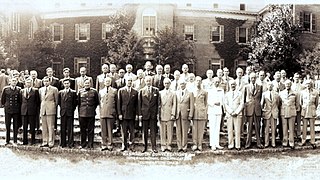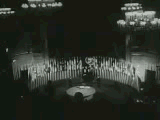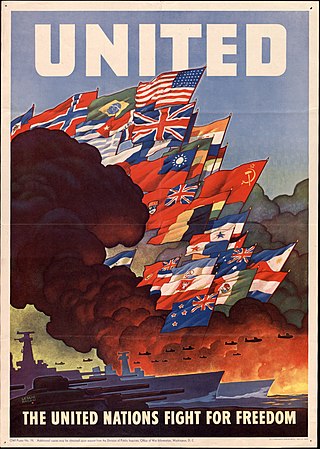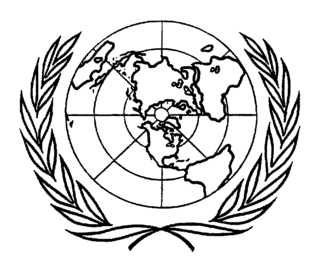
The United Nations (UN) is an intergovernmental organization whose stated purposes are to maintain international peace and security, develop friendly relations among nations, achieve international cooperation, and serve as a centre for harmonizing the actions of nations. It is the world's largest international organization. The UN is headquartered in New York City, and the organization has other offices in Geneva, Nairobi, Vienna, and The Hague, where the International Court of Justice is headquartered.

The United Nations Security Council (UNSC) is one of the six principal organs of the United Nations (UN) and is charged with ensuring international peace and security, recommending the admission of new UN members to the General Assembly, and approving any changes to the UN Charter. Its powers as outlined in the United Nations Charter include establishing peacekeeping operations, enacting international sanctions, and authorizing military action. The UNSC is the only UN body with the authority to issue binding resolutions on member states.

The Charter of the United Nations (UN) is the foundational treaty of the United Nations, an intergovernmental organization. It establishes the purposes, governing structure, and overall framework of the UN system, including its six principal organs: the Secretariat, the General Assembly, the Security Council, the Economic and Social Council, the International Court of Justice, and the Trusteeship Council.

The Yalta Conference, held 4–11 February 1945, was the World War II meeting of the heads of government of the United States, the United Kingdom and the Soviet Union to discuss the postwar reorganization of Germany and Europe. The three states were represented by President Franklin D. Roosevelt, Prime Minister Winston Churchill, and General Secretary Joseph Stalin. The conference was held near Yalta in Crimea, Soviet Union, within the Livadia, Yusupov, and Vorontsov palaces.

The Dumbarton Oaks Conference, or, more formally, the Washington Conversations on International Peace and Security Organization, was an international conference at which proposals for the establishment of a "general international organization", which was to become the United Nations, were formulated and negotiated. The conference was led by the Four Policemen – the United States, the United Kingdom, the Soviet Union, and China. It was held at the Dumbarton Oaks estate in Washington, D.C., from August 21, 1944, to October 7, 1944.

The Atlantic Charter was a statement issued on 14 August 1941 that set out American and British goals for the world after the end of World War II, months before the US entered the war. The joint statement, later dubbed the Atlantic Charter, outlined the aims of the United States and the United Kingdom for the postwar world as follows: no territorial aggrandizement, no territorial changes made against the wishes of the people (self-determination), restoration of self-government to those deprived of it, reduction of trade restrictions, global co-operation to secure better economic and social conditions for all, freedom from fear and want, freedom of the seas, abandonment of the use of force, and disarmament of aggressor nations. The charter's adherents signed the Declaration by United Nations on 1 January 1942, which was the basis for the modern United Nations.
China is one of the charter members of the United Nations and is one of five permanent members of its Security Council.
The United States is a charter member of the United Nations and one of five permanent members of the UN Security Council.

The history of the United Nations as an international organization has its origins in World War II beginning with the Declaration of St James's Palace. Taking up the Wilsonian mantle in 1944-1945, US President Franklin D. Roosevelt pushed as his highest postwar priority the establishment of the United Nations to replace the defunct League of Nations. Roosevelt planned that it would be controlled by the United States, Soviet Union, United Kingdom and China. He expected this Big Four would resolve all major world problems at the powerful Security Council. However the UN was largely paralyzed by the veto of the Soviet Union when dealing with Cold War issues from 1947 to 1989. Since then its aims and activities have expanded to make it the archetypal international body in the early 21st century.
The Military Staff Committee (MSC) is the United Nations Security Council subsidiary body whose role, as defined by the United Nations Charter, is to plan UN military operations and assist in the regulation of armaments. Although the Military Staff Committee continues to exist, negotiation efforts between the United States, the Soviet Union and other nations in the late 1940s failed, and the committee has since been largely defunct, only serving in an advisory capacity.

The Declaration by United Nations was the main treaty that formalized the Allies of World War II and was signed by 47 national governments between 1942 and 1945. On 1 January 1942, during the Arcadia Conference, the Allied "Big Four"—the United States, the United Kingdom, the Soviet Union, and China—signed a short document which later came to be known as the United Nations Declaration, and the next day the representatives of 22 other nations added their signatures.
The Moscow Declarations were four declarations signed during the Moscow Conference on October 30, 1943. The declarations are distinct from the Communique that was issued following the Moscow Conference of 1945. They were signed by the foreign secretaries of the governments of the United States, the United Kingdom, the Soviet Union and the Republic of China. Four declarations were signed at the conference: The Declaration of the Four Nations on General Security, the Declaration on Italy, the Declaration on Austria, and the Declarations on Atrocities.

The United Nations Security Council veto power is the power of the five permanent members of the UN Security Council to veto any "substantive" resolution. They also happen to be the nuclear-weapon states (NWS) under the terms of the Treaty on the Non-Proliferation of Nuclear Weapons. However, a permanent member's abstention or absence does not prevent a draft resolution from being adopted. This veto power does not apply to "procedural" votes, as determined by the permanent members themselves. A permanent member can also block the selection of a Secretary-General, although a formal veto is unnecessary since the vote is taken behind closed doors.

The Allies, formally referred to as the United Nations from 1942, were an international military coalition formed during World War II (1939–1945) to oppose the Axis powers, led by Nazi Germany, the Empire of Japan, and the Kingdom of Italy. Its principal members by the end of 1941 were the "Big Four" - United Kingdom, United States, Soviet Union, and China.

France has been a member of the United Nations (UN) since its foundation in 1945 and is one of the five countries, alongside China, Russia, the United Kingdom, and the United States, that holds a permanent seat on the United Nations Security Council (UNSC), which is responsible for maintaining international peace and security.

The United Nations Conference on International Organization (UNCIO), commonly known as the San Francisco Conference, was a convention of delegates from 50 Allied nations that took place from 25 April 1945 to 26 June 1945 in San Francisco, California, United States. At this convention, the delegates reviewed and rewrote the Dumbarton Oaks agreements of the previous year. The convention resulted in the creation of the United Nations Charter, which was opened for signature on 26 June, the last day of the conference. The conference was held at various locations, primarily the War Memorial Opera House, with the Charter being signed on 26 June at the Herbst Theatre in the Veterans Building, part of the Civic Center. A square adjacent to the Civic Center, called "UN Plaza", commemorates the conference.

The "Four Policemen" was a postwar council with the Big Four that US President Franklin Roosevelt proposed as a guarantor of world peace. Their members were called the Four Powers during World War II and were the four major Allies of World War II: the United Kingdom, the United States, the Soviet Union, and China. Roosevelt repeatedly used the term "Four Policemen" starting in 1942.
India was among the charter members of the United Nations that signed the Declaration by United Nations at Washington, D.C., on 1 January 1942 and also participated in the United Nations Conference on International Organization at San Francisco from 25 April to 26 June 1945. As a founding member of the United Nations, India strongly supports the purposes and principles of the UN and has made significant contributions in implementing the goals of the Charter, and the evolution of the UN's specialised programmes and agencies.

The permanent members of the United Nations Security Council are the five sovereign states to whom the UN Charter of 1945 grants a permanent seat on the UN Security Council: China, France, Russia, the United Kingdom, and the United States.
The Declaration of the Four Nations on General Security, or Four Power Declaration, was signed on October 30, 1943, at the Moscow Conference by the Big Four: the United States, the United Kingdom, the Soviet Union, and China. The declaration formally established the four-power framework that would later influence the international order of the postwar world. It was one of four declarations signed at the conference; the others were the Declaration on Italy, the Declaration on Austria, and the Declaration on German Atrocities.
















